Call Us Today! (203) 975-9600
SAME DAY APPOINTMENTS AVAILABLE
January 2023
Dealing With Painful Heel Fissures
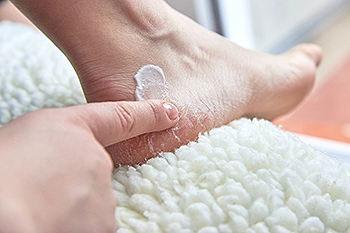
Cracked heels can develop into fissures that become both painful and potentially dangerous. A fissure is a deep crack in the skin of the heel, usually caused by a lack of moisturization. Some conditions can contribute to the formation of heel fissures, including living in a dry climate, frequently wearing open-backed shoes, walking barefoot, and being overweight. Certain underlying medical problems, such as diabetes and hypothyroidism, also may be causes of heel fissures. Because open crevices in the skin can invite bacterial infection, it is essential to deal with heel fissures as soon as possible. Applying good-quality moisture creams or lotions several times a day and covering the feet with socks can speed up the healing process. People with diabetes, poor circulation, or auto-immune deficiency would be wise to consult a podiatrist for help with eliminating heel fissures in a safe and timely fashion.
Cracked heels are unsightly and can cause further damage to your shoes and feet. If you have any concerns, contact one of our podiatrists from Preferred Footcare, LLC. Our doctors can provide the care you need to keep you pain-free and on your feet.
Cracked Heels
Cracked heels appear unappealing and can make it harder for you walk around in sandals. Aside from looking unpleasant, cracked heels can also tear stockings, socks, and wear out your shoes. There are several methods to help restore a cracked heel and prevent further damage.
How Do You Get Them?
Dry skin is the number one culprit in creating cracked heels. Many athletes, walkers, joggers, and even swimmers suffer from cracked heels. Age and skin oil production play a role to getting cracked heels as well.
Promote Healing
Over the counter medicines can help, especially for those that need instant relief or who suffer from chronic dry feet.
Wear Socks – Wearing socks with medicated creams helps lock in moisture.
Moisturizers – Applying both day and night will help alleviate dryness which causes cracking.
Pumice Stones – These exfoliate and remove dead skin, which allows for smoother moisturizer application and better absorption into the skin.
Change in Diet
Eating healthy with a well-balanced diet will give the skin a fresh and radiant look. Your body responds to the kinds of food you ingest. Omega-3 fatty acids and zinc supplements can also revitalize skin tissue.
Most importantly, seek professional help if unsure how to proceed in treating cracked heels. A podiatrist will help you with any questions or information needed.
If you have any questions, please feel free to contact our office located in Stamford, CT . We offer the newest diagnostic and treatment technologies for all your foot care needs.
A Low Bed May Help to Limit Falling Incidents
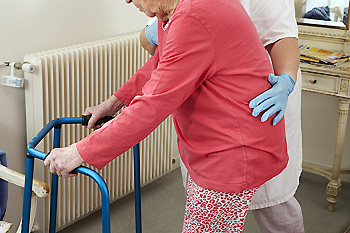
Research has shown that elderly people may be at risk for falling. This can be a result of existing medical conditions, and the body may become weak from the aging process. There are things that can be done which may help to reduce falling episodes. The home may need to be rearranged, which can include removing worn rugs and clutter from the living area and installing grab bars in the shower and toilet area. Additionally, it is beneficial to purchase a bed that is low enough for the feet to touch the floor while sitting on the edge. Performing a routine exercise program can help to strengthen the overall body, possibly reducing the number of falls. Falling may cause the patient to break a foot or a toe, which may lead to the inability to complete daily tasks. If you would like more information about how falling can affect the feet and how to implement additional prevention methods, please consult with a podiatrist.
Preventing falls among the elderly is very important. If you are older and have fallen or fear that you are prone to falling, consult with one of our podiatrists from Preferred Footcare, LLC. Our doctors will assess your condition and provide you with quality advice and care.
Every 11 seconds, an elderly American is being treated in an emergency room for a fall related injury. Falls are the leading cause of head and hip injuries for those 65 and older. Due to decreases in strength, balance, senses, and lack of awareness, elderly persons are very susceptible to falling. Thankfully, there are a number of things older persons can do to prevent falls.
How to Prevent Falls
Some effective methods that older persons can do to prevent falls include:
- Enrolling in strength and balance exercise program to increase balance and strength
- Periodically having your sight and hearing checked
- Discuss any medications you have with a doctor to see if it increases the risk of falling
- Clearing the house of falling hazards and installing devices like grab bars and railings
- Utilizing a walker or cane
- Wearing shoes that provide good support and cushioning
- Talking to family members about falling and increasing awareness
Falling can be a traumatic and embarrassing experience for elderly persons; this can make them less willing to leave the house, and less willing to talk to someone about their fears of falling. Doing such things, however, will increase the likelihood of tripping or losing one’s balance. Knowing the causes of falling and how to prevent them is the best way to mitigate the risk of serious injury.
If you have any questions, please feel free to contact our office located in Stamford, CT . We offer the newest diagnostic and treatment technologies for all your foot care needs.
Two Types of Foot Wounds
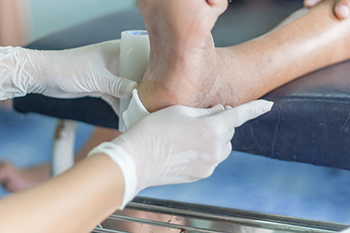
An open wound that develops on the foot can happen from an external or internal injury, which causes the tissue to become exposed to the outside environment. The two categories of wounds are classified as open or closed. The tissue damage that happens under the skin is a closed wound, and a bruise is an accurate example of this. Exposed tissue represents an open wound and can happen from a fall, surgery, or sudden trauma. Open wounds generally require prompt medical attention from a podiatrist who can stop the bleeding and clean the wound, followed by possibly treating it with antibiotics. The wound may heal faster when a proper dressing is applied and is frequently changed. If you have a wound, it is strongly advised that you contact a podiatrist who can effectively treat wounds on the feet.
Wound care is an important part in dealing with diabetes. If you have diabetes and a foot wound or would like more information about wound care for diabetics, consult with one of our podiatrists from Preferred Footcare, LLC. Our doctors will assess your condition and provide you with quality foot and ankle treatment.
What Is Wound Care?
Wound care is the practice of taking proper care of a wound. This can range from the smallest to the largest of wounds. While everyone can benefit from proper wound care, it is much more important for diabetics. Diabetics often suffer from poor blood circulation which causes wounds to heal much slower than they would in a non-diabetic.
What Is the Importance of Wound Care?
While it may not seem apparent with small ulcers on the foot, for diabetics, any size ulcer can become infected. Diabetics often also suffer from neuropathy, or nerve loss. This means they might not even feel when they have an ulcer on their foot. If the wound becomes severely infected, amputation may be necessary. Therefore, it is of the upmost importance to properly care for any and all foot wounds.
How to Care for Wounds
The best way to care for foot wounds is to prevent them. For diabetics, this means daily inspections of the feet for any signs of abnormalities or ulcers. It is also recommended to see a podiatrist several times a year for a foot inspection. If you do have an ulcer, run the wound under water to clear dirt from the wound; then apply antibiotic ointment to the wound and cover with a bandage. Bandages should be changed daily and keeping pressure off the wound is smart. It is advised to see a podiatrist, who can keep an eye on it.
If you have any questions, please feel free to contact our office located in Stamford, CT . We offer the newest diagnostic and treatment technologies for all your foot care needs.
Reminder: When Was the Last Time...?
Healing Diabetic Foot Ulcers
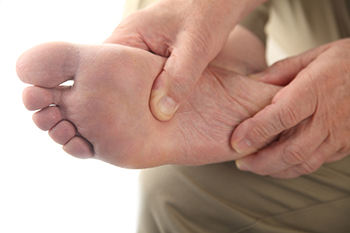
Diabetic foot ulcers are difficult wounds to heal. The size of the ulcer, gender, and potential infection have been linked to healing time. Larger ulcers and infections tend to lead to longer wound closure times, and men tend to have slower healing time for wounds. One way to have a positive effect on wound healing is by making sure glucose levels are within normal range. It is particularly important for diabetics to examine their feet daily to check for cuts and scrapes that can lead to ulcers. If you have diabetes, it is suggested that you include a podiatrist on your health care team and get your feet checked regularly.
Diabetic foot care is important in preventing foot ailments such as ulcers. If you are suffering from diabetes or have any other concerns about your feet, contact one of our podiatrists from Preferred Footcare, LLC. Our doctors can provide the care you need to keep you pain-free and on your feet.
Diabetic Foot Care
Diabetes affects millions of people every year. The condition can damage blood vessels in many parts of the body, especially the feet. Because of this, taking care of your feet is essential if you have diabetes, and having a podiatrist help monitor your foot health is highly recommended.
The Importance of Caring for Your Feet
- Routinely inspect your feet for bruises or sores.
- Wear socks that fit your feet comfortably.
- Wear comfortable shoes that provide adequate support.
Patients with diabetes should have their doctor monitor their blood levels, as blood sugar levels play such a huge role in diabetic care. Monitoring these levels on a regular basis is highly advised.
It is always best to inform your healthcare professional of any concerns you may have regarding your feet, especially for diabetic patients. Early treatment and routine foot examinations are keys to maintaining proper health, especially because severe complications can arise if proper treatment is not applied.
If you have any questions please feel free to contact our office located in Stamford, CT . We offer the newest diagnostic and treatment technologies for all your foot and ankle needs.
What Types of Foods Can Cause Gout?
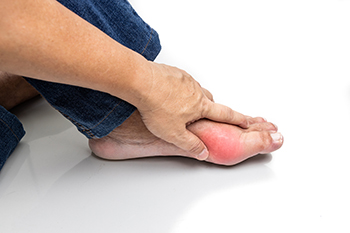
There may be evidence that kidney disease and the foot condition that is known as gout are connected. Gout is an extremely painful ailment that affects the joints in the big toe. It is caused by excess uric acid in the blood which may happen from eating foods that have high levels of purines. The kidneys break down the uric acid, and existing kidney disease may inhibit the ability to do that. Foods that fall into this category can include shellfish, red meat, excessive amounts of alcohol, and drinks that are made with large amounts of sugar. The uric acid forms crystals in the joints of the toes, often beginning with the big toe. This is known as a gout attack and it generally happens suddenly. In addition to the debilitating pain that often accompanies gout, common symptoms can include a limited range of motion, and the affected toe can become red from inflammation. If you have one or frequent gout attacks, it is strongly urged that you are under the care of a podiatrist who can speak to you about effective prevention techniques.
Gout is a painful condition that can be treated. If you are seeking treatment, contact one of our podiatrists from Preferred Footcare, LLC. Our doctors will treat your foot and ankle needs.
What Is Gout?
Gout is a form of arthritis that is characterized by sudden, severe attacks of pain, redness, and tenderness in the joints. The condition usually affects the joint at the base of the big toe. A gout attack can occur at any random time, such as the middle of the night while you are asleep.
Symptoms
- Intense Joint Pain - Usually around the large joint of your big toe, and it most severe within the first four to twelve hours
- Lingering Discomfort - Joint discomfort may last from a few days to a few weeks
- Inflammation and Redness -Affected joints may become swollen, tender, warm and red
- Limited Range of Motion - May experience a decrease in joint mobility
Risk Factors
- Genetics - If family members have gout, you’re more likely to have it
- Medications - Diuretic medications can raise uric acid levels
- Gender/Age - Gout is more common in men until the age of 60. It is believed that estrogen protects women until that point
- Diet - Eating red meat and shellfish increases your risk
- Alcohol - Having more than two alcoholic drinks per day increases your risk
- Obesity - Obese people are at a higher risk for gout
Prior to visiting your podiatrist to receive treatment for gout, there are a few things you should do beforehand. If you have gout you should write down your symptoms--including when they started and how often you experience them, important medical information you may have, and any questions you may have. Writing down these three things will help your podiatrist in assessing your specific situation so that he or she may provide the best route of treatment for you.
If you have any questions, please feel free to contact our office located in Stamford, CT . We offer the newest diagnostic and treatment technologies for all your foot care needs.









